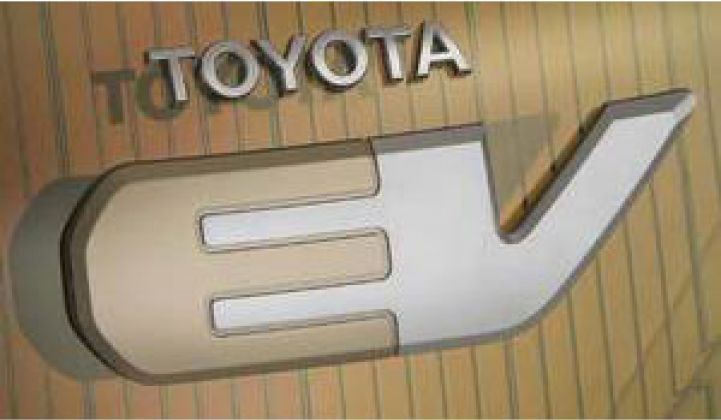Electricity will the one of the top two themes for the North American International Auto Show starting January 11 in Detroit.
The other will be economic desperation.
Toyota, Ford, General Motors and several startups will gather in the Motor City to tout production cars and prototypes that rely wholly or partly on electric power. Still, much of the talk will focus on slow sales and the bailout.
Startup carmaker such as Fisker Automotive and Tesla Motors will show off their electric rides at the show. Fisker Automotive, based in Irvine, Calif., plans to unveil a sedan concept car called the Karma S, which will use the same powertrain developed for its first commercial car, the Karma.
Fisker plans to start delivery the $80,000 Karma, a plug-in hybrid electric sedan, in the fourth quarter of 2009 (see Fisker Opens New Design Center).
Tesla, which is facing money trouble, will have floor space at the show for the first time. Since announcing plans last fall to delay the introduction of its second all-electric car, the Model S, the San Carlos, Calif.-based carmaker has hunkered down to focus on delivering its first model, the Roadster, to customers on a waiting list (see Cash-Strapped Tesla Raises $40M, Loses Lawsuit and Tesla Coughs Up Sedan Price, Details on Economy Car).
Tesla plans to develop a prototype Model S by the end of next month and might show it off publicly as well, said company Elon Musk during a media event in December. Musk will be a keynote speaker at an auto analysts' conference on Jan. 13 that will run in conjunction with the Detroit auto show.
Another new player in the electric car market, BYD Co. from China, also will display its models. The company made a splash last month when it launched a plug-in hybrid called F3DM, which comes with a small gasoline engine for recharging the lithium-ion batteries. BYD plans to sell the car in the United States in 2010.
The launch made BYD the first company in the world to start selling mass-produced plug-in hybrid cars. Currently, owners of the Toyota Prius, for example, can convert their cars to plug-in hybrids using after-market products. A plug-in hybrid can be recharged using an ordinary electrical outlet in the wall.
BYD also plans to launch an all-electric car, the e6, this year in China, reported the Wall Street Journal.
Toyota Motor, the hybrid car leader, will show off new models as well. It announced in a terse press release that it plans to display for the first time an electric concept car. Although Toyota scored a big hit with the Prius, the Japanese giant has been somewhat reluctant to release an all-electric car. It released an all-electric Rav 4 in the early part of the decade, but it didn't sell well. Toyota execs also often note that battery prices and charging times make all-electrics a tough sell.
The company will only say that the concept car has a badge that says "EV". Sources, however, have told the Wall Street Journal that the car is a city car that is similar to those touted by Nissan and Northway's Think. Nissan is skipping the auto show. Think halted production after only releasing a few cars. Think's problem? Lack of funds.
Toyota will also show off its 2010 Prius, which will still use nickel-metal-hydride batteries. The carmakers might use lithium-ion batteries, which can pack more power in the same size, for the Prius starting in 2011. The commuter car may sport a lithium-ion battery.
"Lithium-ion batteries will probably be used in vehicles, but we still have problems," Masatami Takimoto, executive vice president of technology for Toyota, said in a presentation at Copenmind in the Fall. "We do think it's appropriate to use lithium-ion batteries in commuter cars."
Lexus, which is owned by Toyota, also will show off a new hybrid, the HS250h.
Honda will debut a new Insight model, which the carmaker hopes will grab market share from Toyota by pricing the car at $19,000. The Insight will become available in showrooms this year. Honda already has been selling a hybrid Civic, which is priced at $23,650.
All three major American carmakers will display models at the show. General Motors' plug-in hybrid, the Volt, already has gotten a lot of press over the past year. The carmaker is due to start selling the Volt in 2010, and has refuted speculations that the plans would be delay while it sorts out its future.
Whether consumers will see the Volt within two years will depend largely on how GM turns around its near-bankrupt operation. GM and Chrysler are getting up to $17.4 billion from the federal government to avoid bankruptcy. The carmakers have promised to focus on producing more efficiency cars, including the electric versions (see U.S. Automakers Get Federal Bailout).
Times are tough not just for American car companies. Toyota decided last month to delay building Prius in a new Mississippi factory, which was supposed to begin production in 2010.
The hybrid-electric car sales in the United States fell 53 percent in November from a year ago. Toyota saw demand for its Prius hatchback decline nearly half. The company expects to post its first operating loss in 70 years for the current fiscal year, which ends in March 2009.
The depressed economy has prompted seven companies to scale down their displays or ditch the auto show all together, including Nissan, Mitsubishi, Rolls-Royce and Land Rover.
The show is set to debut 58 vehicles, and its organizer expects to draw 700,000 attendees. The show will begin on Jan. 11 with press events and open to the public from Jan. 17 to 25.



